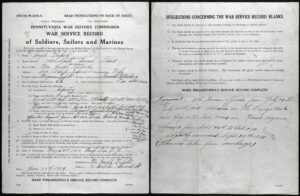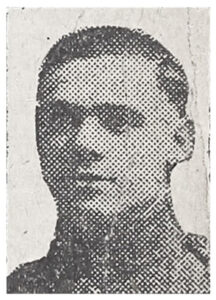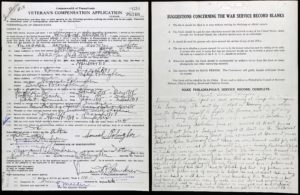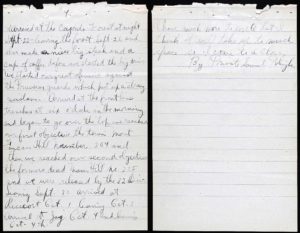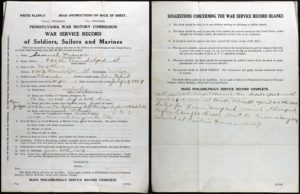Photographs can enliven words.
And sometimes, whether in symbolism or reality, words can illuminate photographs.
Such is the case in “this” post. Continuing with – ahh, but perhaps not concluding! – my writings covering the military service of American Jewish soldiers in the First World War (through a general overview of the military service of American Jewish soldiers during that conflict, in three parts: here, here, and here; via photographic portraits of American Jewish WW I soldiers from the state of Pennsylvania who were military casualties (here, here, and here); and, by biographical profiles of American Jewish soldiers who were military casualties on November 11, 1918), this post presents documents found in Ancestry.com’s collection “Pennsylvania, U.S., World War I Veterans Service and Compensation Files, 1917-1919, 1934-1948”. In terms of depth, detail, and variety of documents, the Pennsylvania collection is by far the richest – ranked by state – of Ancestry’s collections covering the WW I service of American soldiers.
Along with wartime photographic portraits of soldiers, the most interesting documents in the Pennsylvania collection are “Veterans Compensation Applications” and “War Service Records”.
The reason being? These documents were completed by veterans themselves, or, in the all-too-inevitable instances where a soldier never returned, by friends or family members.
In terms of the former, information in these records comprise a soldier’s own, freshly remembered accounts of his wartime service (in his own handwriting!), which recount his service in abbreviated, varying, but always revealing fashion. And, for the purposes of a blog in this is year of 2022 (!), they typically include errors of spelling in terms of geography, which have lent an interesting challenge to writing this post. (!!) In any event, given that well-nigh unto a century has transpired since these documents were written, however brief, they may be the only records of military service personally left by these veterans.
In terms of the latter, the information in these documents is typically all-too-terse, albeit there are exceptions, exemplified by Veterans Compensation Files for Sergeant Irving Sydney Clair and First Lieutenant Edward Benjamin Goward.
And so, this post is comprised of accounts from Veterans Compensation Applications and / or War Service Records for ten soldiers. Of these ten, eight survived the war. They were:
Private Jacob Burstein – Wounded in Action
Sergeant Joseph Leopold – Slightly Wounded in Action
Private Charles Levin – Wounded in Action
Private Samuel Polingher – Shell-Shock
Private Jacob Rubinstein – Wounded in Action
Private Daniel Stein – Wounded in Action
Private Samuel Weiner – Wounded in Action
Private George Winokur – Slightly Wounded in Action
For these men, I’ve transcribed – a verbatimly as possible – their written accounts, while (where possible) clarifying spelling mistakes for geographic features and city names. I find that of Private Polingher particularly moving and inspiring, for refreshingly, in a matter-of-fact and entirely unapologetic way, he mentions, “Arrived Luneville Sept. 15th. where all the Jewish boys celebrated Yom Kippur and on our arrival we were met the branch reformed Jews”. But really, all the accounts are interesting.
The two men who did not return were:
Private Aaron Caplan – Died of Wounds
The second sheet of Private Caplan’s Veterans Compensation Application includes correspondence, in Polish, with the Chairman of the Board of that city’s Jewish Religious Community, Izrael-Boruch Liberman, and, the city’s mayor, J. Piaskowski.
Private Harry Ellman – Died of Wounds
Private Ellman’s mother signed her name to his Veteran’s Compensation Application in Yiddish.
And so, a century after they were written, some brief writing from the past return to the present. Will there be other wars, from which will arise future Veterans Compensation Forms? I don’t know. (Who does?)
Perhaps it is better that the future is unknown to us. (Perhaps.)
*** *** *** *** *** *** *** *** *** *** *** *** ****
Burstein, Jacob, Pvt., 3,106,468
79th Infantry Division, 316th Infantry Regiment, E Company
Wounded in Action (gassed) 9/28/18
Mrs. Florence (Cantor) Burstein (wife), Charlotte Joyce and Lenore Debra (daughters), 6114 Ellsworth St., Philadelphia, Pa.
Mr. and Mrs. Joshua (“Shaya”) and Frida Riba (Ben) Burstein (parents); Mrs. Lena Levy (sister), 4068 Lancaster Ave., Philadelphia, Pa.
Born Riga, Lativa, 11/24/94
Philadelphia Inquirer 11/15/18
Arrived in Camp Meade Md. May 26th 1918.
Left Camp Meade for overseas about July the 6th 1918.
Left New York harbor for France July the 9th, arrived in Brest France July the 18th.
We sailed on the S.S. Agamemnon, which was called before the war Kaiser Wilhelm the II. We stood in Brest for about 4 or 5 days.
After traveling in box cars from Brest for about four or five days and nights we landed in Vause. It is a small town located about twenty kilometers from Dijon.
From Vause we hiked over to a little village Cussey it is about 5 kilometers from the town mentioned above. We were training there until the later part of August.
From there we left for the Front. Before we got to the front we were under fire many times.
September the 26th 1918 my Division the 79th took part in starting of that big drive in the Argonne Forest. I was a platoon runner in my company. September the 28th 1918 I was gassed.
I was transferred from one hospital to another for several times until I landed in base 53 it was a gas hospital and it was located in Congres.
After I left the Hospital, I was sent around to several camps until finally I was classified in class B2, which it meant from 3 to 6 months behind the lines, which at the mean time I was guarding German prisoners.
After the Armistice was signed November the 11th 1918 they never returned me to my original outfit. I was guarding the German prisoners until December outside of Bordeaux.
And I sailed for the U.S. on the S.S. Chicago with a Casual Company. Arrived in the U.S. Jan. 24 – 1919 and was discharged Feb. 8th 1919.
____________________
Caplan, Aaron, Pvt., 3,174,043
4th Infantry Division, 58th Infantry Regiment, F Company
Died of Wounds 11/16/18
Previously Wounded – on 10/1/18
Mr. and Mrs. Chaim and Ruchla Caplan (parents), 26 Krakowska, Augustow, Poland
Mr. Perrine Caplan (uncle), 5723 Hobart St., Pittsburgh, Pa.
Mr. Charles Caplan (brother), 410 East Murphy Ave., Connellsville, Pa.
Born “Kalwari”, Poland / Russia, 8/16/94
Beth Hamedrash Hagodol – Beth Jacob Cemetery, McKees Rocks, Pa. – Section C, Row 2, Lot 54
podpisu Przewodniczacego Zarzadu gminy wyznaniowej zydowskiej
August p. Izraela-Borucha Libermana, niniejszem stwierdzam.
Miasto Augustow, dnia 30 kwietnia 1935 roku
P.o. Burmistrza
The signature of the Chairman of the Board of the Jewish Religious Community
Augustow, p. Izrael-Boruch Liberman, I hereby affirm.
The city of Augustow, on April 30, 1935
After. The Mayor
Wlasnorecznosc podpisu p.o.Burmistrza m.Augustowa J.Piaskowskiego, oraz autentycznosc odcisnietej pieczeci urzedowej stwierdzam. –
Miaso Augustow, dnia 30 maja 1935 roku
I certify the ownership of the signature of the Mayor of Augustow J. Piaskowski, and the authenticity of the imprinted official seal. –
The city of Augustow, on May 30, 1935
Stwierdza sie niniejszem wlasnorecznose podpisa Starosty Stefania Ejchlera oraz autentycznose odeisnietej pieczeci urzedowej Starosty. Powiatowy g. Augustowa 13 maja 1935
It is stated hereby self-signed by the Starosty Stefania Ejchlera and an authentic stamp issued by the Starosty of the County of Augustow 13 May 1935
____________________
Ellman, Harry (Tsvi bar Yitzhak ha Kohen), Pvt., 1,830,815
80th Infantry Division, 320th Infantry Regiment, I Company
Died of Wounds 10/2/18
Mr. and Mrs. Isadore and Dora (Sternberg) Ellman (parents), 97 Taranilor St., Soroca, Bassarabia, Rouamnia
809 Anaheim St., Philadelphia, Pa.
Born “Loblien” (?), Russia, 12/5/94
Beth Abraham Cemetery, Pittsburgh, Pa. – Section 2, Row 19, Plot 4
Harry’s mother’s name appears on the form in Hebrew, with the direct translation being “Dora Helman”, despite the English-language spelling being “Elman” or “Ellman”. Adding a silent “hey” at the end of a name was not uncommon. (Translation by Naomi Cohen. Thanks, Naomi!)
This image of Harry’s matzeva is by FindAGrave Contributor Richard Boyer. As immediately revealed by the carving of a pair of hands with opposing fingers paired as “Vs”., let alone by Harry’s Hebrew name – Tsvi bar Yitzhak ha Kohen – Harry was a Kohen: A descendant of Aaron, brother of Moshe Rabbeinu.
____________________
Leopold, Joseph, Sgt., 1,239,347
28th Infantry Division, 110th Infantry Regiment, A Company
Slightly Wounded in Action 9/28/18
Mrs. Leah (Finkelstein) Leopold (wife), 420 West Susquehana Ave., Philadelphia, Pa.
Mr. and Mrs. Benjamin and Fannie (Rittenberg) Leopold (parents), 2408 South 2nd St. / 1120 S. 2nd St. / 2533 South Philip St., Philadelphia, Pa.
(Philadelphia Inquirer lists address as “1127 S. 2nd St.”)
Born Philadelphia, Pa., 12/19/93
Philadelphia Inquirer 12/18/18
Engagements – 5th German offensive from July 14 to July 27th, 1918. Advance on the Ourcq & Vesle river July 28 to Sept., 1918 inc. Meuse Argonne offensive from Sept 26th to Oct. 9-18.
Slightly wounded Sept. 28th 1918
(This was taken from discharge)
These two news articles and the accompanying photo, presumably from either The Philadelphia Inquirer or Philadelphia Bulletin, are also in Sergeant Leopold’s Veteran’s Compensation File.
Sergeant Leopold, son of Mr. and Mrs. Benjamin Leopold, 2408 South Second Street, was wounded on the third day of the big Allied drive from the Marne, when he and an officer of the 110th Infantry went out scouting into No Man’s Land. He received his wounds trying to save his superior officer, who was also struck down by bullets. Leopold is now recovering in a base hospital in France.
***
On the third day of the big Allied drive from the Marne, a lieutenant and a sergeant of the old Third Regiment, N.G.P. [National Guard of Pennsylvania]., now the 110th Infantry, went out into No Man’s Land on a scouting expedition facing a rain of machine-gun bullets.
Both were carried back wounded, the “non-com” sustaining his injury in a heroic attempt to rescue his superior officer.
The hero is Sergeant Joseph Leopold, 1120 South Second Street. He is now recuperating in a base hospital and expects to be sound again within a few weeks.
In a letter to his parents, Benjamin and Fannie Leopold, 2408 South Second Street, he describes his thrilling experiences.
____________________
Levin, Charles, Pvt., 554,314
26th Infantry Division, 103rd Field Artillery Regiment, F Battery
Wounded in Action 7/18/18 (“high explosive in leg”)
Wounded in Action 10/7/18 (“gassed”)
3206 West 8th St., Los Angeles, Ca.
Mr. and Mrs. Harris and Yetta (Meltzer) Levin (parents), 317 Chestnut St., Pottstown, Pa.
Born Rochester, N.Y., 2/24/99
Philadelphia Inquirer 12/22/18
I have lossed my discharge – some years back so am putting down dates from memory –
When I enlisted in Pottstown I gave a false age saying I was 21 yrs old on July 6th 1917 – Did so because I was afraid they wouldn’t take me or that I’d have to get my Parents consent which I didn’t want to do at the time –
____________________
Polingher, Samuel, Pvt., 2,667,070
37th Infantry Division, 146th Infantry Regiment, A Company
Shell-Shock (date not specified)
Mr. Mabel Polingher (wife), 3322 Pennsylvania Ave., NW, Washington, D.C.
Mr. and Mrs. Benzin and Fege (“Fannie”) Polingher (parents), Hyman Polingher (brother)
Born Romania 8/26/97; Died 5/11/65
Private Samuel Polingher
Leaving Philadelphia April 26, and arriving at Camp Lee Virginia the same day.
The next day I start in training for a soldier live to prepare myself to fight the Germans, and I got along fairly.
Leaving Camp Lee June 19 – 1918 – arrived at Hoboken, N.Y. [sic] June 13 –
Leaving Hoboken June 15 – arrived at Brest June 22
Leaving Brest June 24
Lodged one night at Brest in the Historical Napalion [sic] barracks.
Leaving Brest June 25 – arrived at Bormount June 29
Hiked 15 kilors to Somary Court where we were trained until July 23th
Leaving July 23 – arrived at Rambersvill July 24 –
Leaving Rambersvill July 26 on trucks we rode the whole night we pasted the town named Bacarat [Baccarat] and got off in the woods It was raining the whole night and we began to realize what prospect we have for our future days, there is no doubt that we were all disgusted and I thought myself the only thing we must have is rations and this was the first time that I had to pitch a pup tent.
My partner was a good little fellow and of course he helped me and it didn’t take us long and we had a swell home we got some branches of Pine trees and we laied down on the ground in order to make our bed soft and comfortable My partner and I went to sleep and it started to rain good and hard we heard lots of shooting but we were very tired and we fell asleep and about 10:30 our corporal came and gave us an alarm Boys get up and make your packes Of course no candles were allowed to be lit and just think it was dark and raining, but still I heard my corporal shouting boys we are going over the top and we didn’t know where we were going, but he said we are going out on the road with our packes and start to hike in the darkness that night to a town with the name Bartichomp at 3 o’clock that morning
There were a group of our men from each company to learn how to throw hand granades [grenades] We stood there 2 days and we left for a village named Vacavill where we were four days around the out skirts of Vacovill then we left for the front line trenches
And we came to the trenches at two o’clock at night arriving at the front line trenches August 5th fighting as much as our Americans boys could of done
We left the trenches August 10th arrived at Indian village and at Bacarot Aug. 11th
Leaving Bacarot Aug. 15th arrive at Vacavill Aug. 16
Leaving Vacavill Aug 17th arrived in the wood of Vacavill and then left for St. Marrice Arrived Aug. 30th
We stood in the support line trenches leaving St. Marrice Sept. 15
Arrived Luneville Sept. 15th. where all the Jewish boys celebrated Yom Kippur and on our arrival we were met the branch reformed Jews
Leaving Lunveille Sept. 16 arrived Barzing Sept. 17
Leaving Barzing Sept. 17
Arrived Bacarot Sept. 18 where we got on the train and arrived at Haironvill [Haironville] Sept. 19 and left Sept. 20
We got on the trucks which was driven by Chinese drivers We pasted through the town named Ba-ladut and got of in town named Jubnvill.
Arrived at the Orgonde [Argonne] Forest at night Sept. 22 –
Leaving the forest Sept. 26 and also made a nice big steak and a cup of coffee before we started the big drive.
We started our great offensive against the Prussian guards which put up a strong resistance.
Arrived at the front line trenches at six o’clock in the morning and began to go over the top We reached our first objective the town Mont Foucan [Montfaucon] Hill Number 304 and then we reached our second objective the formers dead Mans Hill No. 305 and we were released by the 32 Div.
Leaving Sept. 30 arrived at Ricicort [Récicourt] Oct. 1 leaving Oct. 3
Arrived at Ja_ Oct. 4 and leaving Oct. 4th.
I have much more to write but I think it will take up to much space so I came to a close.
By Private Samuel Polingher
____________________
Rubinstein, Jacob, Pvt., 1,785,617
79th Infantry Division, 315th Infantry Regiment, Machine Gun Company
Slightly Wounded in Action 9/29/18 (“gassed”)
Mrs. Dora (Borden) Rubinstein (wife), Rose, Evelyn, and Eugin (daughters and son), 4301 Atlantic Ave., Wildwood, N.J.
Mr. and Mrs. Wolf (“William W.”) and Anna Rubinstein (parents), 2103 N. 31st St., Philadelphia, Pa.
Born “Tcherkass”, Kiev, 1896
Philadelphia Inquirer 12/1718
Have been gassed, it happened this way.
One dreary rainy night, being packeted in a little street between Mountfocan [Montfaucon] and the Hun, Frits finally got my number, a gas shell hit a man (standing in front of me) who fell right on me and I inhaled the perfume
Have been in about 25 Hospitals, Convalessense, Replacement Camps Have made good use of the French 8 horses or 40 men box cars.
Our Co. has been stationed in the following villages Shattelonot, Haronvill [Arronville?], Dombasel [Dombasle-sur-Meurthe?]
After the Armistice I found my Co. in Etray, then we hiked to Shomont Sur oir [Chaumont-sur-Loire], had a 120 mile hike with stops in about 50 villages, then settle in Remacourt a big Base Hospital center
Then a five day trip to Verton a little, rest and homeward bound to St. Nazier [Saint-Nazaire]
There we stayed 4 days and moved 8 times
Have been categorized and sterilized, and undergone inspections of all descriptions.
But one little incident that I’ll never forget.
That was in St. Agnion [Saint-Agnan] a Replacement Camp where they worked Christmas and New Years
One rainy day on detail as usual, the Commanding Officer some Major past us by and made the following remark
“I don’t see why the Government raised your wages at that time when 50c a day is too much for you.” But he is excused. This prohibition wasn’t in force in France.
____________________
Stein, Daniel, Pvt., 1,237,695
28th Infantry Division, 109th Infantry Regiment, L Company
Wounded in Action 7/15/18
1006 East 12th St., Chester, Pa.
Mr. and Mrs. Nathan and Clara (Brodman) Stein (parents)
Mrs. Max Rubin (aunt), 215 Christian St., Philadelphia, Pa.
Born Philadelphia, Pa., 6/9/98
Enlisted in 1917 without informing parents.
Pennsylvania Veterans Compensation Application: “Veteran’s service credited to New York and has failed to furnish proof of Pennsylvania residence.”
Philadelphia Inquirer 8/30/18
This half-tone photo of Pvt. Stein (certainly taken before he was Private Stein!) was published in the Philadelphia Inquirer on August 30, 1918.

In order to make my service record clearer, I’ll elaborate my service.
Co. L., 13th Inf. Is the original organization I joined in 1917. Around the beginning of 1918, we were reorganized and called the 28th Div., hence Co. L., 109th Inf.
July 15th, I was wounded; July 18th I became a prisoner-of-war; until Dec. 7th when all of us were released and brought to Vichy, France.
A few weeks later we were organized into Casualty Companies at St. Agnan, France; and as a member of Co. I – 1st Bn – 143 D.B. I came home and was discharged at Camp Dix, N.J.
Daniel Stein
____________________
Wiener, Samuel, Pvt., 1,240,238
28th Infantry Division, 110th Infantry Regiment, M Company
Wounded in Action 8/25/18
2547 West Division St., Chicago, Il.
Mr. and Mrs. Alexander and Ida (Glick) Wiener (parents), 932 N. 2nd St., Philadelphia, Pa.
Born “Rovno” (?), Russia, 7/18/96
Occupation: Employee of Dupont in Wilmington, De.
Philadelphia Inquirer 10/6/18, 12/21/18
Begun July 21 at Phila., 3rd Pa. Inf. Armory ‘till 8/10
Camp Taylor 69th Market Sts ‘till Sept. 10th
Camp Hancock, Ga. Sept. 15, 1917 until April 24th
Arrived Camp Merritt April 27th 1918
Sailed for France May 2nd.
Arrived at Liverpool England May 16th 1916
Went to France May 17th.
Arrived at Cailais [Calais] France same day.
Philadelphia Inquirer
October 6, 1918, or, December 21, 1918
The Americanization of young “Sammy” Weiner, which began just nine years ago when he reached the United States an emigrant boy from Russia, passed through the final stages on the fields of France in July and August. As a member of the 110th Infantry he went unscathed through the seering [sic] blasts of German fire along the Marne in July and participated in the stirring pursuit of the boche from the Ourcq to the Vesle. The 110th reached the Vesle on August 6 and the next day Private Wiener wrote a brief letter to his mother, Mrs. Ida Weiner, 832 North Second Street.
The weeks passed after that with no news until last Saturday an ominous looking telegram came from Washington. Mrs. Weiner does not read English and she turned the telegram over to her daughter. It stated: –
“We regret to inform you that Private Samuel Weiner has been missing in action since August 26.”
Mrs. Weiner came to this country from Russia some years after her son landed here, yet she, too, has absorbed the spirit of the American mother. Her daughter translated the flow of Jewish [Yiddish] from her lips: –
“Sammy loves his new country, and I love it and I have given him willingly. But if he is missing I feel sure that he will turn up all right.”
Private Weiner is 22 years old. He enlisted in the old Third Regiment, in July, 1917, and went with it to camp Hancock where it was transformed into the 110th Infantry and he was assigned to Company M. He came home in his soldier suit on a short furlough just before the regiment sailed overseas last May, and it was a question who was the more proud, the mother at the sight of her stalwart son in khaki or the lad himself in the new uniform just issued to him with the crossed rifles on his collar and the jaunty overseas cap.
Wiener was down at the Du Pont plant in Wilmington, Delaware, making powder for the Allies when this country entered the war. He stayed on the job for a month or more and then came home.
“I guess I’ll have to go shoot some of the stuff I have been making at the Germans,” he explained to his mother, and went down to the recruiting office and signed up in the Third Regiment. He was mustered in out at Bywood [a neighborhood in Upper Darby, a suburb of Philadelphia adjacent to the western edge of the city of Philadelphia], and was out of the awkward squad and full-fledged soldier before the regiment _____ for its final training.
____________________
Winokur, George, Pvt., 1,900,879
82nd Infantry Division, 326th Infantry Regiment, B Company
Slightly Wounded in Action (“gassed”) 10/13/18
435 Segal St., Philadelphia, Pa.
Mr. and Mrs. Max and Sarah (Tonkonoff) Winokur (parents), 1821 S. 5th St., Philadelphia, Pa.
Born New York, N.Y., 12/21/94
Philadelphia Inquirer 12/25/18 (Philadelphia Inquirer lists surname as “Minokur”, and lists date as 10/13/18)
I went in France April 28, 1918 and I was in the Toul Front on July. And also in the Champaine [Champagne] Battle and I got gassed in the Arrogone [Argonne] Forrest.
I had my gas mask on for 6 hours in a shell hole and my gun was broke from shrapnel and I was taken to a field dressing station & then sent to a base hospital.
I came back with the _____ Ship and it took eleven days & I went over in six days with the Marratannia. [Mauretania] I am now well & in the best of health.
George Winokur
1821 So 5th St.
Phila. Pa.





